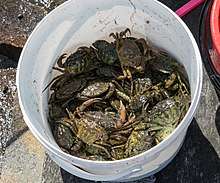Crab mentality
Crab mentality, also known as crabs in a bucket (also barrel, basket, or pot) mentality, is a way of thinking best described by the phrase "if I can't have it, neither can you".[1] The metaphor is derived from a pattern of behavior noted in crabs when they are trapped in a bucket. While any one crab could easily escape,[2] its efforts will be undermined by others, ensuring the group's collective demise.[3][4]

The analogy in human behavior is claimed to be that members of a group will attempt to reduce the self-confidence of any member who achieves success beyond the others, out of envy, resentment, spite, conspiracy, or competitive feelings, to halt their progress.[5][6][7][8]
Impact on performance
Crab mentality affects performance in an organization as humans behave in similar manner as the crabs particularly within social teams.[9] The impact of crab mentality on performance was quantified by a New Zealand study in 2015 which demonstrated up to an 18% average exam result improvement for students when their grades were reported in a way that prevented others from knowing their position in published rankings.[10]
See also
References
- L. Douglas Wilder (October 1, 2015). Son of Virginia: A Life in America's Political Arena. Lyons Press. p. 185. ISBN 978-1-4930-1952-6.
- Low Robin Boon Peng (2016). Good Intentions Are Not Enough: Why We Fail At Helping Others. World Scientific. p. 104. ISBN 978-981-320-059-3.
- Sudipta Sarangi (April 1, 2013). "Capturing Indian 'Crab' Behaviour". The Hindu. Retrieved December 1, 2015.
- Miller, Carliss D. (January 2015). "A Phenomenological Analysis of the Crabs in the Barrel Syndrome". Academy of Management Proceedings. Academy of Management. 2015: 13710. doi:10.5465/AMBPP.2015.13710abstract.
- Manuel B. Dy (March 3, 1994). Values in Philippine Culture and Education. Council for Research in Values and Philosophy. p. 40. ISBN 978-1-56518-041-3.
- Herbert A. Leibowitz (December 31, 1994). Parnassus: Twenty Years of Poetry in Review. University of Michigan Press. p. 262. ISBN 978-0-472-06577-6.
- Albert Shanker (June 19, 1994). "Where We Stand: The Crab Bucket Syndrome". The New York Times. Retrieved December 1, 2015.
- David, E. J. R. (2013). Brown Skin, White Minds: Filipino / American Postcolonial Psychology. Charlotte, NC: Information Age Publishing. p. 119. ISBN 978-1-62396-209-8.
- Dietrich, David M.; Kenworthy, Michael; Cudney, Elizabeth A. (2019). Additive Manufacturing Change Management: Best Practices. Boca Raton, FL: CRC Press. p. 44. ISBN 978-0-367-15207-9.
- Spacey, Simon (2015). "Crab Mentality, Cyberbullying and "Name and Shame" Rankings". Waikato University, New Zealand. Retrieved April 19, 2015. Cite journal requires
|journal=(help)